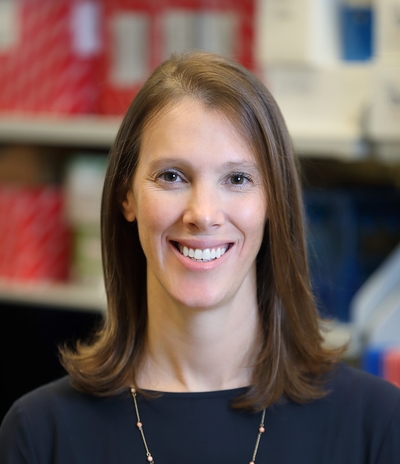
Research Topics
Dr. Heske is a clinician and physician-scientist with an active translational and clinical research program focused on sarcoma treatments. Her goal is to improve outcomes for patients with pediatric sarcomas by understanding mechanisms of resistance and identifying and evaluating new therapeutic targets.
Major projects in her lab focus on understanding and targeting the biologic vulnerabilities in tumor metabolism and DNA repair in pediatric sarcomas such as Ewing sarcoma and rhabdomyosarcoma.
In addition to conducting preclinical research, Dr. Heske is invested in translating promising laboratory findings into early-phase clinical trials for young patients with sarcoma. She currently leads a phase I/II trial for patients with relapsed solid tumors, including Ewing sarcoma and rhabdomyosarcoma that uses a promising combination therapy and is developing several additional trials based on work in her lab.
Biography
After completing her undergraduate work at Harvard University, Dr. Heske received her M.D. from The George Washington University School of Medicine and Health Sciences. She completed her pediatric internship and residency at Brown University/Hasbro Children's Hospital, followed by her fellowship training at the combined National Cancer Institute-Johns Hopkins University Pediatric Hematology and Oncology program, where she served as Chief Fellow and conducted post-doctoral work in the lab of Dr. Lee Helman. In 2016, Dr. Heske began her own group as a Physician-Scientist Early Investigator in the Pediatric Oncology Branch. She was promoted to Investigator in 2021 and currently leads the Translational Sarcoma Biology Group.
She is the recipient of numerous awards including a ASCO Young Investigator Award, a Children's Cancer Foundation Research Award, and an NIH Distinguished Mentor Award. Dr. Heske holds board certifications in General Pediatrics and Pediatric Hematology/Oncology.
Selected Publications
- Yeung C, Gibson AE, Issaq SH, Oshima N, Baumgart JT, Edessa LD, Rai G, Urban DJ, Johnson MS, Benavides GA, Squadrito GL, Yohe ME, Lei H, Eldridge S, Hamre J 3rd, Dowdy T, Ruiz-Rodado V, Lita A, Mendoza A, Shern JF, Larion M, Helman LJ, Stott GM, Krishna MC, Hall MD, Darley-Usmar V, Neckers LM, Heske CM. Targeting Glycolysis through Inhibition of Lactate Dehydrogenase Impairs Tumor Growth in Preclinical Models of Ewing Sarcoma. Cancer Res. 2019;79(19):5060-5073.
- Heske CM, Davis MI, Baumgart JT, Wilson K, Gormally MV, Chen L, Zhang X, Ceribelli M, Duveau DY, Guha R, Ferrer M, Arnaldez FI, Ji J, Tran HL, Zhang Y, Mendoza A, Helman LJ, Thomas CJ. Matrix Screen Identifies Synergistic Combination of PARP Inhibitors and Nicotinamide Phosphoribosyltransferase (NAMPT) Inhibitors in Ewing Sarcoma. Clin Cancer Res. 2017;23(23):7301-7311.
- Heske CM, Mendoza A, Edessa LD, Baumgart JT, Lee S, Trepel J, Proia DA, Neckers L, Helman LJ. STA-8666, a novel HSP90 inhibitor/SN-38 drug conjugate, causes complete tumor regression in preclinical mouse models of pediatric sarcoma. Oncotarget. 2016;7(40):65540-65552.
- Heske CM, Yeung C, Mendoza A, Baumgart JT, Edessa LD, Wan X, Helman LJ. The Role of PDGFR-β Activation in Acquired Resistance to IGF-1R Blockade in Preclinical Models of Rhabdomyosarcoma. Transl Oncol. 2016;9(6):540-547.
- Wan X, Yeung C, Heske C, Mendoza A, Helman LJ. IGF-1R Inhibition Activates a YES/SFK Bypass Resistance Pathway: Rational Basis for Co-Targeting IGF-1R and Yes/SFK Kinase in Rhabdomyosarcoma. Neoplasia. 2015;17(4):358-66.
Related Scientific Focus Areas
This page was last updated on Thursday, September 25, 2025

